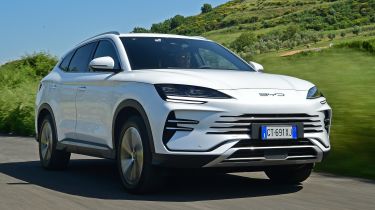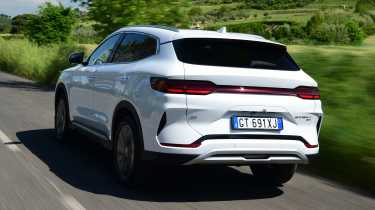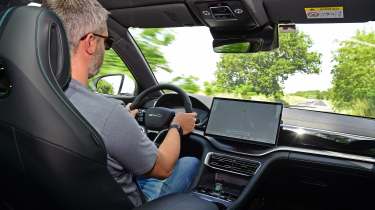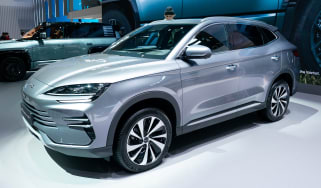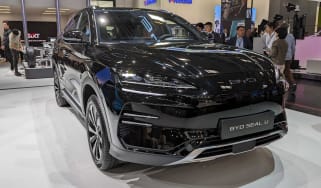New BYD Seal U DM-i 2024 review: plug-in hybrid SUV prioritises comfort over agility
The new plug-in hybrid BYD Seal U DM-i is practical and cheap, but is let down by the way it drives
Verdict
The BYD Seal U DM-i will surely succeed on account of its practical cabin, strong tech and low price, but the driving experience needs some work. Buyers in this part of the market don’t demand super-sharp handling, but the Seal U’s vague steering and inconsistent ride quality mean it never really settles. This is a particular shame, because the electric Seal saloon with which the SUV shares a name, is among the best cars in its class to drive.
If the Society of Motor Manufacturer and Traders’ (SMMT) monthly registration figures are anything to go by, appetite for electric cars is struggling to find momentum. All the while, petrol models continue to maintain strong market share, with hybrids gaining in popularity, too.
It means cars like this latest plug-in BYD Seal U DM-i plug-in hybrid are perfectly placed to capitalise on current trends; big electric range for zero local emissions, plus a petrol engine for anxiety-free longer journeys.
The Seal U is available with a choice of battery and motor configurations and even the most affordable version has the ability to slash your monthly bills while also offering a stepping stone toward full electrification. Basic ‘Boost’ models get a 18.3kWh battery, which BYD says is capable of 50 zero-emission miles, or nearly 700 miles when combined with the four-cylinder petrol motor and a full tank of petrol.
A ‘Comfort’ variant will arrive later in the summer with a larger 26.6kWh battery, boosting the EV range to an impressive 78 miles. Both of these models are front-wheel drive; the range-topping Design car driven here uses the smaller battery but adds an extra electric motor for all-wheel drive. Our car’s EV range tops out at 43 miles – still good for an eight per cent Benefit-in-Kind (BiK) company-car tax rating.
The system itself is quite complicated, as both the battery and engine can directly power the wheels depending on how the car is being driven. Most of the time, the petrol part acts as a generator, topping up the battery and giving the Seal U an electric-lite feel. But put your foot down or raise your speed significantly, and that engine supplements the cells and sends its shove straight to the front axle. And because more often than not it’s just working away in the background, the transition is pretty smooth.
The petrol unit does drone a little if it kicks in around town, but you’ll not notice it on the motorway – not least because there’s quite a bit of road and wind noise from the 19-inch wheels and chunky door mirrors.
Unfortunately, we’re not able to offer any intelligence on how many miles you might realistically manage on a full battery, due to the fact BYD deemed it sensible for us to start our drive with just 25 per cent charge. We therefore drove most of the test route letting the systems do their thing, cycling through the various drive modes as appropriate.
These drive modes don’t do an awful lot to influence the driving experience. Sport mode only alters the throttle map – though you can change the weight of the steering via the on-screen menus. The damping is completely passive, too, with no way of firming things up or softening them off as your mood dictates.
Herein lies our biggest problem with the way the BYD Seal U drives. First impressions are of a car that unashamedly prioritises comfort over agility – and in an SUV such as this, we’ve no real issue with that. However, what initially feels like a soft set-up, quickly exposes itself as one that offers little control (and therefore confidence), across a variety of surfaces.
On fast, undulating tarmac the body occasionally feels like it’s floating on top of the chassis, appearing disconnected from the road. But while this is no major cause for concern on the motorway, A and B roads pose a bigger problem; hitting a bump or camber mid-corner completely upsets the BYD’s balance – an issue only exaggerated by the car’s noticeable body roll. It’s not dangerously sloppy, but you do sometimes feel like you’re holding on and hoping for the best.
It’s not a particularly fast car, despite what the figures might suggest. We also had a go in the less powerful front-wheel drive model, and despite the lack of a turbo it didn’t feel significantly slower. If you don’t need the added security of all-wheel drive (most won’t) that’s where the smart money goes.
Then there’s the constant pitter patter that’s evident underneath you. It’s not so bad that you’ll notice shocks through the base of your seat, but even on visibly smooth roads the Seal U never truly settles. Honestly, we’d hoped for a little more composure.
But while the BYD can’t hold a light to a Volkswagen Tiguan or Toyota RAV4 on the road, it makes up for things with a strong tech offering and decent cabin quality. We’re familiar with the company’s super-quick 15.6-inch rotating touchscreen from other models in the range, and it works as well here as it does elsewhere.
It’s a good job that the screen is so clear; the back window is very narrow, meaning rearward visibility is affected when reversing. But the countless cameras give an excellent view of what’s around you, which makes manoeuvring the near-4.8m-long SUV less of a challenge than you might reasonably expect.
We were particularly impressed with how BYD appears to have tuned its myriad safety systems to make them less intrusive in the Seal U, too. Whereas previously you’d be left delving into the menus to switch off the nannying lane-keep assist, here you can leave it on without worrying it’ll nudge you aggressively left or right if you deviate even slightly from your chosen path. The Chinese work fast, there’s no doubt about that.
Practicality is a strong suit, too. The long wheelbase and totally flat floor mean there is plenty of space in the rear – particularly in terms of leg room. The 425-litre boot doesn’t sound that big, but we reckon it’d be sufficient for most young families, even if there’s no space under the floor to store the charging cables.
There are no trims as such, with the Boost, Comfort and Design specs each relating to the powertrain options as previously discussed. That means every car comes with the twin screens and a head-up display, dual wireless phone-charging pads, vegan leather alternative on the seats, a panoramic roof and a high-end Infinity stereo. Even at £40,000-plus, that’d be considered a lengthy list of kit, but the Seal U is expected to start from under £34k.
That will, for sure, be the big attraction for family-car and company-car buyers seeking out an affordable mid-size SUV, not yet swayed by the plethora of pure-electric options currently flooding the market. Make the most of that electric range and you could slash your costs versus a like-for-like petrol or diesel car.
| Model: | BYD Seal U 1.5 DM-i AWD Design |
| Price: | £38,995 (est) |
| Engine: | 1.5-litre 4cyl turbo petrol PHEV |
| Power/torque: | 319bhp/550Nm |
| Transmission: | Single-speed auto, four-wheel drive |
| 0-62mph: | 5.9 seconds |
| Top speed: | 112mph |
| Economy/CO2: | 256.8mpg/26g/km |
| Size (L/W/H): | 4,775/1,890/1,670mm |
| On sale: | Summer |

